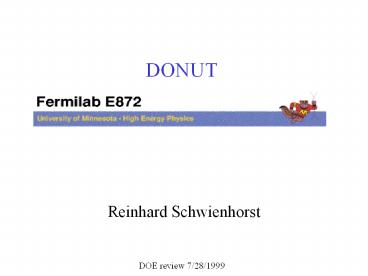DONUT PowerPoint PPT Presentation
Title: DONUT
1
DONUT
- Reinhard Schwienhorst
DOE review 7/28/1999
2
The DONUT collaboration
- University of Minnesota
- P. Border
- C. Erickson
- K. Heller
- L. Mualem
- R. Rusack
- R. Schwienhorst
- J. Sielaff
- J. Trammell
- Aichi University, Kobe University, Nagoya
University, Science Education Institute of Osaka
Prefecture, Toho University, Utsunomiya
University, University of California at Davis,
Fermilab, Kansas State University, University of
Minnesota, University of Pittsburgh, University
of South Carolina, Tufts University, University
of Athens, College de France, Gyeongsang National
University, Changwon National University, Connam
National University, Kon-Kuk University, Korean
National University of Education, Pusan National
University, Wonkwang University
3
Outline
- Introduction
- experimental goal
- apparatus
- Analysis flow
- Emulsion analysis
- Neutrino interaction examples
- Preliminary physics results
- Outlook
- Conclusions
4
Tau neutrino
- From particle data group
- Experimental goal establish nt existence
directly - also search for rare processes
5
Experimental Technique
- Neutrino production in Ds decay
- High density beam-dump proton target
- Short-lived particles decay
- Long-lived particles interact before they can
decay - High intensity proton beam (5?1013 P per spill)
- Identification of individual nt CC interactions
- Nuclear emulsion neutrino target
- t decay can be identified (decay length ?2mm)
- Shielding to protect the emulsion from muons
- Conventional spectrometer
- Determine which part of the emulsion to analyze
- Identify interaction products
6
Apparatus
Spectrometer
Target stand
veto wall
analysis magnet
EMCAL
emulsion modules
scintillating fiber planes
target stand
muon ID
drift chambers
7
Emulsion module
Bulk module (84 plates)
ECC module (54 plates)
1mm
base
emulsion
base
emulsion
steel
- 95 of the mass is emulsion
- fully sensitive
- 5 of the mass is emulsion
- sampling detector
- less emulsion volume ? cheaper than bulk
- new technology
8
Emulsion technique
- Charged particles passing through emulsion
- ionization
- black silver grains after development
- size?1mm
- plates must be aligned to ?1mm
- hardware x-ray sources
- software penetrating muons
- Scanning stage (microscope) must have
resolution lt 1mm
9
Emulsion scanning station
- Scanning table
- Microscope
- CCD camera with frame grabber
- X-Y precision moving table
- digitize one field of view ((200mm)2) at 16
depths - track recognition hardware
- track selector
- combine 16 dots to track segments
- Computer
- control stage
- record track segments
- Current scanning speed 8h/event ((5mm)2?20mm)
10
Data analysis flow
of events
step completed?
Events on tape
6,600,000
- Strip events
- vertex in U view or
- high p track or
- calorimeter energy gt30GeV
330,000
- Filter
- neutrino interaction vertex
70,000
- Human scan
- remove background
- predict vertex location
event selection vertex prediction
1,000
- Emulsion scanning
- in Japan
- locate event
- Event analysis
- decay kink search
11
Emulsion data analysis
- Scan Back
- project a single track from spectrometer into
emulsion - follow the track upstream until it stops
- locate other tracks coming from this vertex
- difficult in events with many tracks
- Net Scan
- predict a vertex position with the spectrometer
- scan the volume around this position
- software vertex search
- takes more time than scan back
12
Emulsion net scan step 0prepare vertex
prediction
13
Emulsion net scan step 1all tracks
14
Emulsion net scan step 2tracks that start
inside the volume
15
Emulsion net scan step 33-track vertex
16
Example events
- ne CC interaction
- nm CC interaction
- nt CC interaction candidate
- charm production candidate
17
ne charged current interaction
e
n
W
N
X
18
ne charged current interaction
19
nm charged current interaction
m
n
W
N
X
20
nt charged current interaction candidate
decay products
n
t
n
n
W
N
X
Each black axis is 1mm long
21
nt charged current interaction candidate
22
Charm production candidate
e or m
n
W
X
N
charmparticle
charm decay products
23
Searching for rare events mnt
- Tau neutrino magnetic moment
- current limit mnt lt5.410-7mB
- interaction n? e? ? n? e?
- expect ?40 magnetic moment interactions
- if mnt 5.410-7mB
- for a low-energy electron cutoff at 1GeV
24
Neutrino magnetic moment interaction (MC)
n?
n?
g
e?
e?
25
Analysis status
- 860 neutrino interactions have been found with
the spectrometer - ?450 events have been scanned
- 144 interactions have been located so far
26
Preliminary physics result
Number of events
out of 144 found events from an enriched
sample
Prompt neutrinosdoes not includeefficiencies
, background, etc
27
Outlook
- Spectrometer analysis
- predict vertex location for all events
- MC studies
- efficiencies, neutrino spectrum, ...
- Emulsion analysis
- more events have to be scanned
- Nagoya
- vertex search
- Nagoya, starting in the US
- decay kink search
- Nagoya, starting in the US
28
Challenges
- Alignment
- spectrometer
- spectrometer to emulsion
- emulsion
- sheet to sheet
- distortions in a sheet
- Information exchange Nagoya ? US
- presence of US collaborators in Nagoya improves
information flow - Spectrometer analysis
- good vertex prediction
- Emulsion analysis
- vertex location
29
Conclusions
- DONUT will achieve its goal
- Preliminary result
- we have seen nt interaction candidates
- we will see gt10 nt interactions
- we will do parameter studies
- Some work still remains
- Emulsion scanning takes time
- vertex location takes precision

